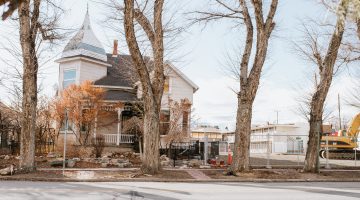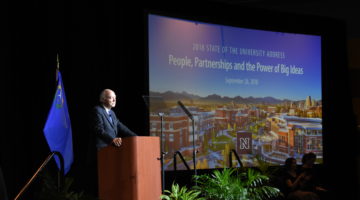By Rocío Hernández
Since 2012, the University of Nevada, Reno faculty and administration have come together to exchange ideas in an effort to improve the campus.
UNR President Marc Johnson, Provost Kevin Carman and Faculty Senate Chair Chuck Price met with faculty members on Tuesday, Feb. 10 in the Joe Crowley Student Union Ballroom at the first Campus Conversations of the spring semester.
The event allows faculty to voice their concerns and opinions on each event’s chosen topic. The most recent dialogue focused on the university’s goal of obtaining “Carnegie Research University/Very High” classification.
“A research university provides a unique learning experience because of the level of research going on at the university,” Carman said. “It allows you to attract the absolutely best faculty because they want to be at a place that is at the leading edge of their disciplines.”
Under the Carnegie Research classification system, UNR is currently considered a “Research University/High” institution. The university’s Strategic Planning for 2014 – 2021 and the Master Plan 2015 – 2024, released in fall 2014, outlined the steps necessary to achieve a higher classification.
University administration has recognized a need for additional researchers and space. As a result, they plan to renovate labs within Palmer Engineering, the Scrugham Engineering and Mines Building, the Chemistry Building and Leifson Physics. Administration also plans to construct a new engineering building, hire 250 faculty members and create 450 graduate research assistantships by 2021.
According to Carman, 30 faculty positions were already authorized last year and 41 were approved for this year. The university has funded the new positions through the growing student enrollment. Carman expects the added positions will not only will be crucial in achieving RU/VH classification, but also in lowering the current student to faculty ratio of 22 to 1.
“This is part of our commitment to the students so it isn’t just going to vanish into the university somewhere,” Carman said. “We are investing in them by hiring more faculty to provide a better experience for them.”
Faculty members argued that the university also needs to focus more efforts on faculty retention. According to some audience members, UNR is not competitive with other research universities. They noted that they have witnessed former colleagues leave the university for other Institutions that offered more money in salary and start-up costs.
Marcelo Vazquez, associate dean of students, agreed that a greater emphasis on faculty retention is necessary.
“With a doubt, hiring more tenure-track professors is not enough in helping Nevada become a Research University/Very High,” Vazquez said. “To reach this level, more funding needs to be provided to the newly hired faculty members in the form of start-up packages for the faculty for their research.”
Other concerns raised by faculty centered on responsibilities such as inputting grades and filing paperwork that took time away from their research. One professor informed the panelists that the university’s current grading system required him to enter students’ grades one at a time. Carman has since met with representatives from the Registrar’s Office to identify possible solutions for expediting the grade inputting process.
Price has seen changes come out of prior Campus Conservations. He noted that both Johnson and Carman take faculty’s concerns seriously. Price, Carman and the faculty senate executive board have come together to prioritize some of the issues presented at the last Campus Conversation that revolved around university communication.
“We are never going to solve all of our problems,” Carman said. “We are always going to be a big university with some bureaucracy and we have to work with that, but we always have to work on making our operations as efficient and effective as possible for faculty and students.”
Vazquez said that faculty retention and research are essential to the university’s development.
“These are two areas we need to address and will address as our university continues its trajectory toward becoming a national model of RU/VH status, Hispanic Serving Institution status, serving higher numbers of historically underrepresented students and creating a vibrant college graduation culture,” Vazquez said.
The next Campus Conversation, scheduled for March 9, will focus on university growth. More information about the event can be found on the faculty senate’s homepage at unr.edu/facultysenate.
Rocío Hernández can be reached rhernandez@sagebrush.unr.edu and on Twitter @rociohdz19.











